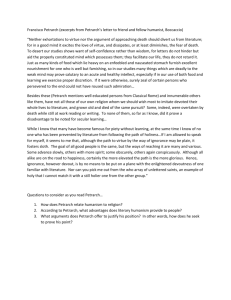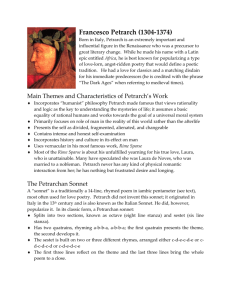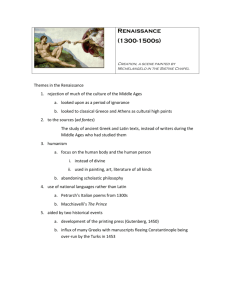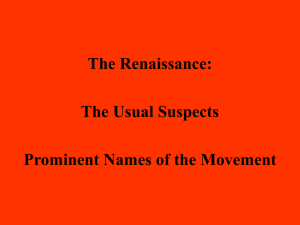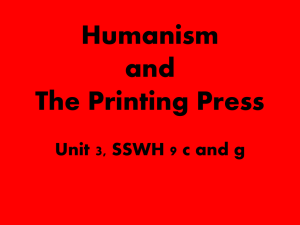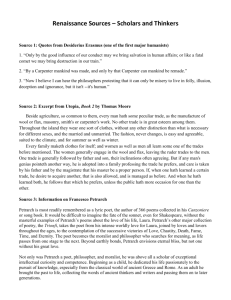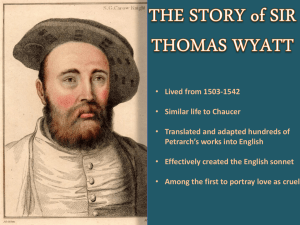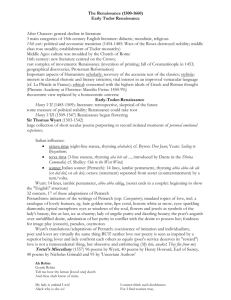The Age of Humanism: Petrarch's Role
advertisement
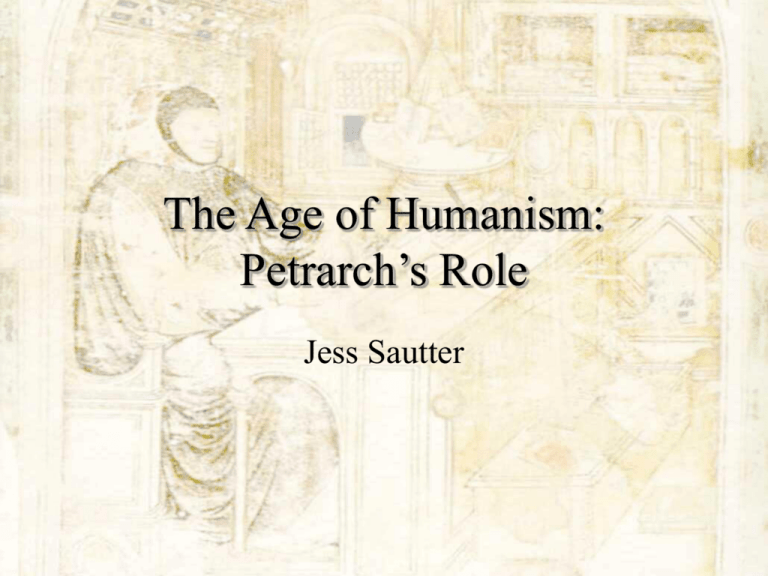
The Age of Humanism: Petrarch’s Role Jess Sautter Beginnings of Humanism • Early Humanism formed in a culture spiritually determined by mendicant friars (Dominicans and Franciscans) • Voluntary poverty was the center of true Christian conduct • In the fourteenth century, scholarship shifted from the hands of the Church to the hands of laymen such as lawyers and doctors. – These men revived the classical studies of Greece and Rome – Instead of focusing exclusively on God and religion, they were more interested in human aspects such as culture, society, and values. Principles of Humanism • Salutati – Man is responsible for his good or bad deeds – God does not control a man’s will or morality – It is better to benefit others by living an active public life than to live as a monk, which does not benefit anyone other than the monk Principles of Humanism • Bruni – Medieval values of piety, humility, and poverty not important – Attitudes about wealth, credit finances, and usury modified – Pagan elements introduced into Christian culture • Emphasized the dignity and worth of the individual • People are rational beings who possess within themselves the capacity for truth and goodness • Emphasized the value of the Greek and Latin classics for their own sake, rather than for their relevance to Christianity • Collection and translation of classical manuscripts • Inspired by Plato (Aristotle inspired medieval scholarship) • Centered around education • Attempted to develop the character and intelligence of pupils by a general literary study of the ancient classics • Interested in grammar, rhetoric, poetry, history, and ethics as an alternative to the Scholastic curriculum which laid emphasis on logic, natural philosophy (science), medicine, law, and theology • Humanism was mostly a new educational discipline, not a philosophy of life • To write well and speak effectively, it is necessary to closely study and to imitate the ancient classics • Created a new mental outlook by establishing that the study of ancient literature and the writing of new works based on this inspiration contributes directly to the dignity, usefulness, and happiness of human beings • Stimulated critical attitudes and freed minds from the old systems • Lessened the ecclesiastical monopoly of learning and challenged philosophy to deal with practical subjects such as ethics • Revived ancient literary forms such as the dialogue, essay, familiar letter, comedy, tragedy, ode, and the literary treatment of history, biography, moral philosophy, and political theory • Ideal life is dedicated to scholarship • Values of the Civis Romanus influenced and nurtured the idea of ceaseless activity of the mind • New solutions to all political, social, artistic, and ethical problems could be found in the classics • Humanism sought for polish and elegance of diction, ease and wit in expression, and, at the same time, they wished to avoid involved argument, subtle distinctions, and all obscure terminology • Restored the whole surviving heritage of Greek and Latin literature, edited all of it, and, later, brought out printed editions of the whole • Introduced the idea of a lay morality which laid stress on ethical conduct as an end in itself. • Increased the sense of the dignity of man and emphasized what man can do for himself Factions of Humanism • Stoic—Rely on the power of reason alone to achieve contentment – Neither material goods nor misfortune should have any meaning – Stoicism in a Christian framework was popular in intellectual circles as a remedy for the affluent and commercialized age – Life of poverty is necessary for a wise man’s independence of mind – Every step from poverty to wealth was bound to increase human desire, greed, passion, unrest, and misery • Christian-Neoplatonist • Aristotelian-Epicurean Francesco Petrarch • Born in Arezzo in 1304 after his father was banished from Florence • Began to study law in 1316 because his father wanted him to • His father died in 1326 and Petrarch abandoned his legal studies; discovered Cicero, Vergil, and the Latin classics; began his exclusive devotion to literature • In 1327 he accepted minor ecclesiastical vows but did not accept powerful or prestigious positions • Traveled through Europe 1327-1336 • Given the title of Poet Laureate in 1340 • Returned permanently to Italy in 1353 Two Periods of Petrarch’s Life • Great boldness Influenced solely by ancient philosophers • Ignored his “true self” because of too many distractions (fame, success of Laura sonnets, title of Poet Laureate) • Awareness of the insufficiency of his earlier way of life • Need to identify more closely with contemporary ways of thinking introduced during the Christian Era The First Modern Intellectual • Petrarch had a deep understanding of what ancient Latin and Greek literature had been in antiquity • He was very interested in making literature the greatest of intellectual activities • Founded philology, the systematic and scientific study of all literary and linguistic phenomena • Made poetry his sole profession Petrarch and Politics • He was not involved in politics • He had a sentimental and intellectual attachment to Italy • He was interested in individual affairs, not in political affairs • He viewed Italy as a centralized unity under Rome and, influenced by the history of classical times, had ideas of a republic or a universal empire • Petrarch believed that the Vita solitaria was the supreme standard for living – A truly wise man is focused on intellectual and spiritual matters, not distracting political problems Petrarch and Solitude • He felt that being alone, in the absence of avarice, was the secret to happiness • He was happiest when he lived by himself in his country home • He never truly integrated into any group or society that he joined • Autonomy and freedom were needed to apply himself to his humanistic studies Petrarch and wealth • Petrarch hated wealth, power, and external honors – It was not the wealth itself that he hated, but the anxiety, toil, and trouble connected with it • He said he would rather live in bitter, abject poverty than be wealthy • At another time, however, he said that he would rather be wealthy because living in poverty is only bearable for those who do it in the name of Christ • One should not escape wealth, but one should not possess it “with an avaricious mind” Petrarch as a Humanist • Belonged to the Stoic faction • However, he often had warm emotional reactions, which are more characteristic of a Christian, not Stoic, attitude • Felt that all of Medieval culture was uniformly barbarous…classical-minded scholars and poets were needed to lead humanity away from the arid Scholastic rationalizing and the cultural degradation into which it had been sunk ever since the Barbarian Migrations • Influenced by Horace, Lucan, Statius, Persius, Juvenal, Martial, Cicero, Livy, Seneca, and Caesar • Petrarch wanted to pull himself out of the physical and mental world around him to live imaginatively in Roman antiquity • He loved the classical ways of feeling, thinking, and writing • He admired the polish, elegance, and perfection of form of the Classics as opposed to the un-Roman Latin of the Middle Ages • He took words, methods of sentence structure, figures of speech, and stories from the Latin classics and gave them a new European life • Petrarch had intellectual autonomy and an aesthetic, political, and moral outlook on life • He combined Classical-pagan and Christian-Medieval elements into universal humanism, which states that sentiments, conscience, and self-analysis are a part of every human being, not just pagan or Christian Petrarch’s Works • All of his works contain self-analysis, meditation, internal dilemmas, and crisis concerning moral and cultural values “Secret Conflict of My Desires” • Petrarch states he had difficulties while attempting to resolve the inner conflicts between reason and emotion • He puts forth the passions which had pushed him from one false, petty goal to another • Struggles to conquer the passions which stem from his lower nature Canzoniere • Manifests the beginning of modern consciousness – An awareness of the end of the great dogma of divine providence which had held much power before – As a result, man realizes his tragic destiny, his isolation, and analyzes his continuous sense of dissatisfaction and oscillation between opposing feelings • Petrarch seeks the absolute, divine, and eternal. He experiences anxiety because he cannot cast off his worldly concerns, such as fame and glory, and therefore cannot achieve spiritual peace • The surface meaning of the work indicates a story of unfulfilled love and the different emotions that the lover goes through; however, there are no concrete facts to point to this interpretation – Petrarch’s love for Laura impedes his search for control over and distancing from his human aspirations and desires • Conflict between divinity (religion and reason) and humanity (desire, passion, enthusiasm, and poetic activity) • Petrarch searches for truth while at the same time experiencing conflict between what he is and what he should be • The style of the work is based on classical Latin style Letter to Posterity • • • • Autobiography with moral considerations Classical style Statements about love really concern literature “I have always possessed an extreme contempt for wealth; not that riches are not desirable in themselves, but because I hate the anxiety and care which are invariably associated with them. I certainly do not long to be able to give gorgeous banquets. I have, on the contrary, led a happier existence with plain living and ordinary fare than all the followers of Apicius, with their elaborate dainties.” • “I fled, however, from many of those to whom I was greatly attached; and such was my innate longing for liberty, that I studiously avoided those whose very name seemed incompatible with the freedom that I loved.” • “I possessed a well-balanced rather than a keen intellect, one prone to all kinds of good and wholesome study, but especially inclined to moral philosophy and the art of poetry.” • “Among the many subjects which interested me, I dwelt especially on antiquity, for our own age has always repelled me, so that, had it not been for the love of those dear to me, I should have preferred to have been born in any other period than our own. In order to forget my own time, I have constantly striven to place myself in spirit in other ages, and consequently I am delighted in history.” • “I gave up the subject [law] altogether, however, so soon as it was no longer necessary to consult the wishes of my parents. My reason was that, although the dignity of the law, which is doubtless very great, and especially the numerous references it contains to Roman antiquity, did not fail to delight me, I felt it to be habitually degraded by those who practise it.” • “He offered to bestow that honour upon me at Naples, and urged me to consent to receive it there, but my veneration for Rome prevailed over the insistence of even so great a monarch as Robert.” • “Who, nowadays, could hope to equal one who, in my judgment, was the greatest in an age fertile in great minds?” (Augustine) • “Had I been of riper age I should not have desired it. The aged love what is practical, while impetuous youth longs only for what is dazzling. The laurel brought me no increase of learning or literary power, as you may well imagine, while it destroyed my peace by the infinite jealousy it aroused.” • “I believe that I speak but the strict truth when I claim that as there is none among earthly delights more noble than literature, so there is none so lasting, none gentler, or more fruitful; there is none which accompanies its possessor through the vicissitudes of life at so small a cost of effort or anxiety.” Petrarch’s Contributions to Humanism • Recognition of the true features of classical Latin prose and poetry • Admiration for Cicero • Passion for collecting ancient manuscripts • Perception that the future of classical scholarship depended upon the recovery of Greek works • Support for Humanism among the rich and powerful • Reconciliation between pagan and Christian ways of thinking Petrarch’s Influence on Humanism • Petrarch was concerned with individual matters, not general problems • As a consequence, few humanists of the next generations were directly influenced by him • Petrarch did not influence many of his fellow humanists, either, because his life was so different than theirs (isolationism) • However, Petrarch is still considered to be the father of Humanism because he broke with tradition and completely changed the way people thought, learned, and lived.
